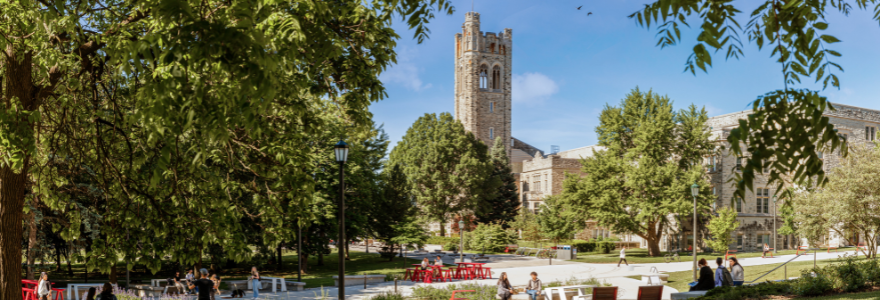Faculty and Staff

Western has a long tradition of experiential learning in both curricular and co-curricular formats, and across many disciplines. To support the delivery of high-quality experiential learning, this section includes the following information for faculty and staff:
- Tools and Examples from existing experiential learning activities at Western
- Safety and Accessibility considerations when leading experiential learning activities
- Work With Us; ways that our unit supports faculty and staff in the planning and delivery of experiential learning activities
Faculty and staff are also encouraged to work closely with the Centre for Teaching and Learning on experiential learning course design and Western International when planning international experiential learning activities.
What is Experiential Learning?
At Western experiential learning is defined as:
An approach that educators use to intentionally connect learners with practical experiences that include guided reflection. EL allows learners to: increase and apply disciplinary knowledge, develop transferable skills, clarify interests and values, strengthen career engagement and employability, and collaborate meaningfully with communities.
Active Learning v. Experiential Learning
The Centre for Teaching and Learning at Western describes active learning as an approach to instruction that requires students to thoughtfully engage with the course material, and often with one another. Experiential learning is on the spectrum of active learning, representing activities that involve the greatest level of engagement from the student and emphasizing personal reflection throughout the learning experience.

Accessibility Transcript (EL and AL Spectrum)
Short/Simple to longer and complex, one can view three classes. On the active learning, short/simple end of the spectrum, there are items such as minute papers, clickers or online polls, dotmotcracy, group discussion, quesecussion, brainstorming, and role-playing. In the middle of the spectrum under the heading in-class experiential learning, there are items such as case-based learning, research, simulation, lab, creative or physical practice/performance, entrepreneurship, and industry project. On the longer or complex side of the spectrum are out-of-class experiential learning opportunities such as field experience, community engaged learning, practicum (or placements), independent student abroad, internship, exchange, faculty-led study abroad, and co-op.
The Experiential Learning Cycle
In addition to consulting Western's experiential learning principles, faculty and staff may also consider the following cycle from experiential learning theorist David Kolb (1984) when planning an experiential learning activity. Kolb’s theory identifies four stages in the learning cycle, as illustrated below: Concrete Experience, Reflective Observation, Abstract Conceptualism, and Active Experimentation.
As students participate in their experience, they should have multiple opportunities to reflect through journaling, questionnaires, or in-person meetings with supervisors. Following the completion of a student’s experience, students should reflect on their learning from the experience as a whole, allowing new ideas and abstract concepts to arise. Finally, students apply their new ideas to the world around them.

Communities of Practice for Experiential Learning at Western
Faculty and staff leading experiential learning are encouraged to consider participating in one of the following Communities of Practice (CoP), through which members can share, learn, and engage with each other on experiential learning topics.
Community Engaged Learning (CEL) Community of Practice
This group consists of faculty who teach curricular community engaged learning courses. It is led by the Community Engaged Learning Coordinators on the Experiential Learning team who facilitate monthly lunch and learns with guest speakers and featured topics.
For help with any questions, or to join this CoP, contact cel@uwo.ca.
Work Integrated Learning (WIL) Working Group
This group includes staff and faculty that support internships, co-ops, and practicums at Western. The group meets regularly to share resources and best practices.
For help with any questions, or to join this Working Group, contact wil-coordinator@uwo.ca.
Western is committed to achieving barrier-free accessibility for persons with disabilities studying, visiting, and working at Western. Students participating in experiential learning may need accommodations and Western is committed to a collaborative approach, encouraging community and industry partners to embed EDID principles and protocols in their recruitment strategies through the support of hirewesternu Ability. You are encouraged to contact Accessible Education for additional support.

